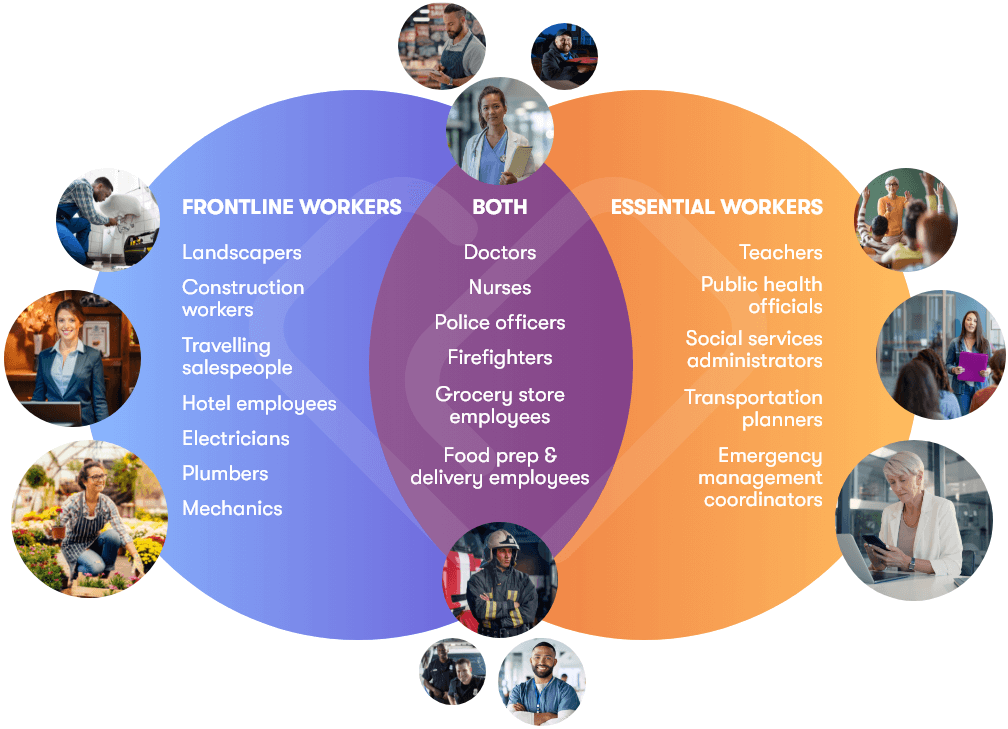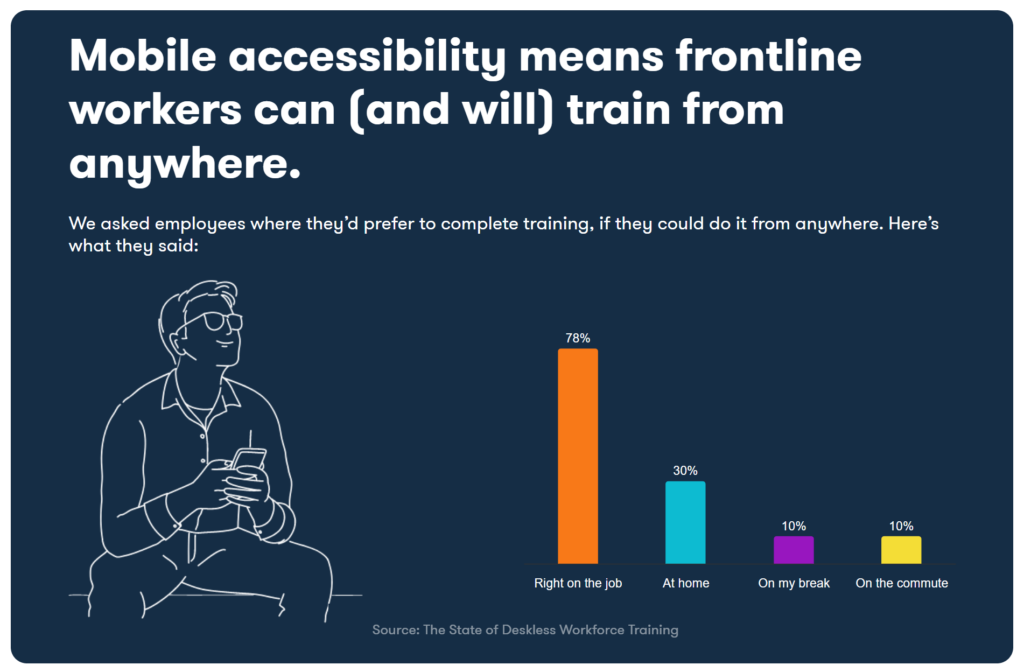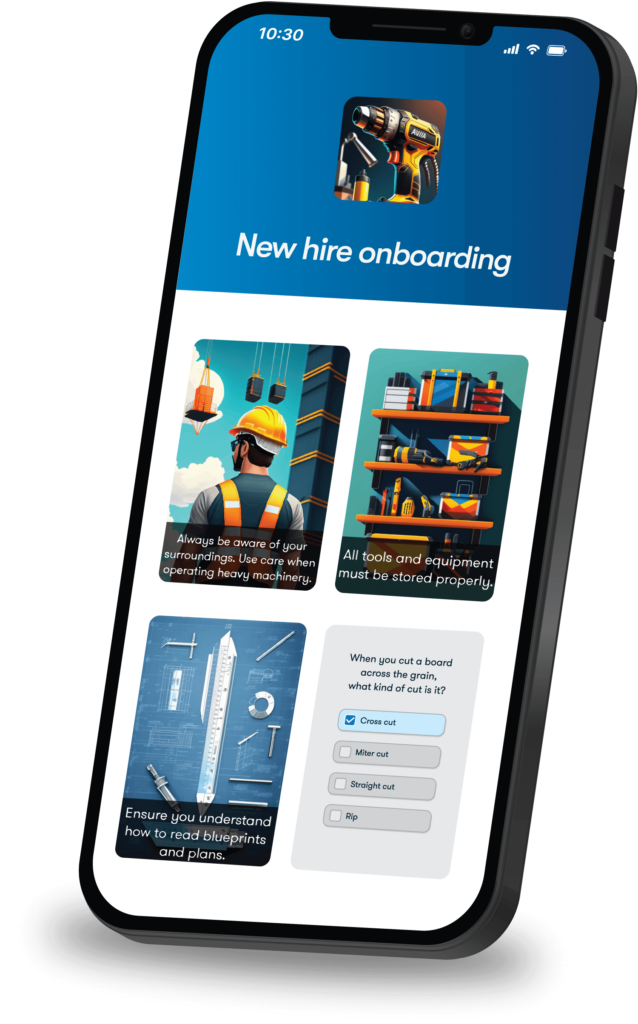The term “frontline workers” gained significant attention, and rightly so, during the COVID-19 pandemic. While many people transitioned to working from home, frontline workers and essential workers continued their jobs in person to keep our lives going. Healthcare providers, grocery store clerks, waste management workers, and more showed up so we could stay home.
While the term frontline worker isn’t new, its meaning has morphed given how it has been used since 2020. The words “frontline” and “essential” are often used interchangeably when describing this type of worker. It’s important to note that they aren’t the same thing.
This comprehensive guide takes a deep dive into the realm of frontline workers— the individuals who keep things running smoothly in manufacturing, construction, healthcare, retail, hospitality, and more. We’ll unravel what defines and sets them apart, and how they drive their industries forward.
In this guide we’ll explore their responsibilities, roles, and the unique hurdles they face. Whether you’re a fellow frontline worker, an industry enthusiast, or simply curious to learn more, come along as we examine the frontlines of different professions.
What are frontline workers?
Historically, frontline workers’ meaning had its roots in describing those at the forefront of the battle, often facing immediate action. Over time, the term has expanded to encompass employees on the frontline of industries. They interact with customers and the primary functions of the business.
Today, frontline workers are vital to the makeup of various industries, and are actively engaged in the heart of operations. They’re the friendly face at your grocery store checkout, the coordinators and contractors on construction sites, the caregivers in hospitals, and much more.
Simply put, frontline workers are the hands-on people who directly interact with customers, products, or services.
Is there a difference between frontline workers and essential workers?
Yes, there is a difference between the two, and it’s crucial to distinguish between frontline workers and essential workers. While some essential workers are indeed frontline workers, not all frontline workers are classified as essential.
Frontline workers were originally described as deskless employees actively involved in customer-facing or hands-on roles within industries. Their importance predates the intense focus brought on by the COVID-19 pandemic.
With the recent spotlight on their critical roles during the pandemic, the term “frontline workers” became synonymous with essential workers. This isn’t always the case, though. Some essential workers are on the frontline, but not all. And some frontline workers are essential, but not all. Let’s take a deeper look:
Frontline vs. essential workers breakdown

The key differences between frontline and essential workers stem from the scope of their roles and the associated risk levels. Here’s an overview of these distinctions:
Frontline workers are integral members of an organization, providing vital services to the general public. They typically hold roles requiring close interaction with the public or colleagues, increasing their vulnerability to illnesses like COVID-19. For this reason, the term frontline worker became commonplace in 2020.
Some essential workers are frontline workers, but not all frontline workers are essential workers. Essential frontline workers sustain critical infrastructure, provide services and operations, and ensure community well-being. Essential workers are in various sectors like healthcare, transportation, logistics, food and agriculture, law enforcement, public safety, and more.
On the same hand, while many frontline workers are essential workers, not all are. Some examples of frontline workers who weren’t classified as “essential” during the pandemic include salespeople, retail employees in stores which remained closed, landscapers, and so on.
Roles and responsibilities of frontline workers
The roles and responsibilities of frontline workers vary greatly depending on the industry. Because they are often public-facing, they are critical to your organization’s success.
Frontline workers fulfill a crucial societal role by providing direct services to customers, clients, or service recipients. This covers a broad spectrum of responsibilities, including aiding customers in locating groceries, conducting medical procedures, fixing machinery, delivering packages, and more.
Moreover, they substantially influence the customer experience, actively crafting a positive atmosphere for customers. This involves answering questions, troubleshooting problems, and resolving issues.
Frontline workers also act as representatives of their respective organizations, essentially becoming the face of the brand. They have crucial roles in the well-being of communities and economies and make sure their organization’s goals and values are upheld. Knowing their work well is very important. They must understand the subject matter they deal with and assist customers based on their expertise.
In preparation for their roles, many frontline workers undergo internal training to ensure they are equipped to interact with customers. This training covers various aspects, including product knowledge, customer service skills, and other essentials related to their job.
It’s not uncommon that much of this information takes the form of tribal knowledge, or knowledge that is unwritten and not formally documented within the organization. Tribal knowledge is incredibly common in companies with deskless employees, making it important that you give team members a reliable way to pass this info along in a form that preserves it.
The more you consider your daily interactions, the more you’ll notice those who are frontline workers. Without them, our lives wouldn’t function the same.
Frontline workers by industry
Globally, more than 2 billion people work in frontline roles. In the U.S., 82% of employees are on the frontline. When examining these roles, you’ll notice that they’re, in fact, your deskless workforce. Here are some examples of frontline industries:
Manufacturing
Let’s first focus on the manufacturing world and their frontline workers. Engineers and technicians, working as the brains behind the operation, form the backbone of factories and production units.
Their primary objective? To oversee production lines, ensuring machinery operates with precision and upholds the necessary quality standards. Be it an expansive automobile factory, a cutting-edge tech assembly line, or a food processing plant, these individuals drive progress.
Investing in the frontline worker experience is a strategic move within the manufacturing landscape. By creating precise career trajectories for frontline workers, manufacturing companies can empower them to cultivate new leadership skills and promote them to leading positions. This investment not only enhances recruitment efforts, but also improves retention rates.
Here are some examples of frontline workers in manufacturing:
- Assembler
- Machine Operator
- Production Worker
- Quality Control Inspector
- Material Handler
- Forklift Operator
- Maintenance Technician
- Welder
- Packaging Operator
- Shipping and Receiving Clerk
- Inventory Control Specialist
- Team Leader
- Production Supervisor
- Manufacturing Technician
- Industrial Engineer
- Safety Supervisor
Food and beverage workers
Let’s shine a spotlight on the food and beverage frontline workers. They are the foundation of the industry; without them, we wouldn’t be able to enjoy restaurants, bars, and fast food drive-throughs to enjoy delicious meals and drinks.
Their main role? Being the welcoming faces of customer service, smoothly taking our food and drink orders, and ensuring our dining experience is exceptional. Whether it’s a local eatery, a bustling school or hospital cafeteria, or a high-end restaurant, you’ll find these individuals working hard to offer guests a pleasurable experience.
All of this isn’t easy. They spend much of the workday on their feet, handling heavy trays and hot plates. During busy meal hours, efficiency is critical to provide prompt service even amid the hustle and bustle. Whether our dining out experience is for pleasure or necessity, those working in frontline positions are vital to the operation.
Here are some examples of frontline workers in the food and beverage industry:
- Waiter/Waitress
- Bartender
- Host/Hostess
- Barista
- Cashier
- Dishwasher
- Food Runner
- Busser
- Expediter
- Fast Food Attendant
- Food and Beverage Director
- Food Server
- Food Service Supervisor
- Line Cook
- Prep Cook
Construction and contracting
Now, let’s pivot to the world of construction and contractors. These individuals create critical infrastructure and are the driving force behind the development of our cities and how we live.
Frontline workers in construction and contracting handle diverse tasks, from site preparation and equipment operation, to building structures and ensuring safety compliance. They execute blueprints and plans, turning concepts into concrete reality.
Providing comprehensive training to frontline workers in construction is a must. Training programs enhance skills, safety, and efficiency, which leads to successful project execution.
The construction industry is experiencing the highest number of unfilled job openings ever. Creating a nurturing environment for construction and contractors has never been more important. Providing avenues for growth, continuous learning, and opportunities to take on new challenges can elevate their experience and expertise. These investments attract top talent and enhance retention rates, establishing a workforce that grows the industry.
Here are some examples of frontline workers in the construction and contracting industry:
- Construction Laborer
- Carpenter
- Heavy Equipment Operator
- Electrician
- Plumber
- Welder
- Mason
- Roofing Installer
- Concrete Finisher
- Painter
- HVAC Technician
- Surveyor
- Crane Operator
- Foreman
- Project Manager
Healthcare
Now, let’s turn our attention to healthcare frontline workers. These individuals are the heart and soul of medical facilities, tirelessly working to provide care, support, and medical expertise that keep our communities healthy.
They’re the caregivers, the nurses, and the comforting presence at the bedside. Whether it’s a hospital, a clinic, or an emergency room, these dedicated individuals are on the frontline of providing medical attention and care when people need it most.
Long hours, emotionally demanding situations, and the pressure of critical decisions demand resilience and empathy. Their dedication to compassionate care and making split-second decisions defines the healthcare industry’s commitment to our well-being.
Focusing on the well-being and growth of frontline workers in the healthcare sector is critical. This is done through providing professional development, mental health support, and a positive work environment.
Here is a frontline essential workers list in the healthcare industry:
- Registered Nurse
- Physician
- Medical Assistant
- Emergency Medical Technician (EMT)
- Paramedic
- Pharmacist
- Respiratory Therapist
- Certified Nursing Assistant (CNA)
- Surgeon
- Phlebotomist
- Physical Therapist
- Occupational Therapist
Retail
Whether they’re in a huge chain store, or a local mom and pop boutique, retail employees play a key role in the in-person shopping experience. These individuals are the face of stores, assisting customers, maintaining inventory, and more.
They are customer service ambassadors, product knowledge experts, and helpful guides through the aisles.
Challenges include standing long hours, managing diverse customer needs, and handling busy checkout lines while maintaining a friendly demeanor. Providing top-notch customer service and creating an enjoyable shopping experience are critical in the retail industry.
Here are some example of frontline workers in the retail industry:
- Sales Associate
- Cashier
- Store Manager
- Customer Service Representative
- Stocker
- Retail Supervisor
- Visual Merchandiser
- Loss Prevention Specialist
- Retail Associate
- Inventory Clerk
- Assistant Store Manager
- Sales Representative
- Department Manager
With such a massive number of frontline workers, the list of industries isn’t limited to what’s above. From our list of frontline workers we can’t leave out those in industries like:
Essential services:
The unsung heroes of maintaining cleanliness and safety are cleaning, sanitation, and janitorial workers.
Transportation:
Bus drivers, train operators, rideshare drivers, and truck drivers keep the transportation system running smoothly, ensuring the delivery of goods and services.
Airline employees:
Pilots, flight attendants, aircraft mechanics and technicians, air traffic controllers, baggage handlers and ramp agents, and many more play a critical role in helping millions of people get to and from their destinations every day.
Hospitality workers:
Whether they’re at the front desk, in maintenance, in the kitchen, or elsewhere, hospitality workers keep the tourism industry running smoothly.
And the list goes on!
How can you invest in your frontline workers today?
Investing in your frontline workers isn’t just a strategy. It’s a necessity. One effective approach to invest in your staff is through training. Leveraging mobile training platform
offers a low-cost, high-return, easy-to-implement solution to your training needs.
Why a mobile training platform?
Mobile training platforms provide accessible and flexible learning for your frontline workforce. The availability of mobile devices is widespread, and leveraging them for training ensures convenience and effectiveness.

Cost-effective learning
Mobile training platforms are a more cost-effective solution than traditional training methods. Reduce the hefty expenses that come with physical training facilities, printed materials, and travel while achieving strong learning outcomes.
High return on investment
Investing in mobile training platforms pays off through enhanced productivity, efficiency, and a well-trained workforce. As frontline workers gain valuable skills and knowledge, they contribute more effectively to your organization’s success, yielding a high return on your investment.
Easy implementation
Integrating mobile training platforms into your existing systems is straightforward. A high-quality mobile training platform is user-friendly, easily customizable, and tracks progress. With an implementation process that is smooth and hassle-free, it’s a must for any company with frontline workers.
Investing in your frontline workers through mobile training platforms boosts their skills and fosters a culture of continuous learning. This approach ultimately leads to a more engaged, satisfied, and productive workforce, positively impacting your bottom line.
Make training accessible anywhere with a powerful mobile learning app

FAQs
What is the role and responsibility of a frontline employee?
Frontline employees, or frontline workers, are often customers’ or clients’ first point of contact. Their roles and responsibilities vary by industry, but some include:
- Assisting customers
- Service delivery
- Maintaining quality and safety standards
- Product knowledge
What is an information worker versus a frontline worker?
Information workers and frontline workers have different roles and responsibilities within organizations.
Frontline workers work on the go with customers and are more hands-on with the product or service. A frontline worker might be a nurse, an electrician, or a maintenance worker.
Information workers typically work behind the scenes in desk-bound positions with data and knowledge. An information worker might be an IT support specialist, a data analyst, or a web developer.
What is a clear frontline worker definition?
Frontline workers are employees who typically carry out their jobs away from a fixed workstation. They do not work from behind a desk and typically do not use laptops for their everyday tasks, instead working on-site in positions that require hands-on work. For this reason they are also referred to as deskless workers.
Elevating frontline workers through training
Who are frontline workers? They’re the bedrock of many industries we need to survive. Their jobs are often challenging, yet 64% say they would not switch to a desk job with the same pay and benefits given the chance.
Investing in their growth and well-being is not just an organizational strategy— it’s a testament to recognizing their immense contributions. By providing them with opportunities for training and advancement, nurturing a supportive work environment, and acknowledging their efforts, we contribute to a vital workforce.
So, as we go about our daily routines, let’s remember to appreciate these frontline workers who keep so many parts of it running.
Create training your frontline workers can access anywhere with TalentCards



